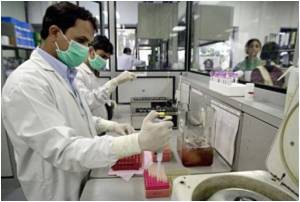For years, research has mainly focused on individual, family and peer factors to explain illicit drug use, neglecting neighborhood factors as a cause.

Published in the journal of Substance Abuse Treatment, Prevention, and Policy, the study, "Perceived Neighborhood Illicit Drug Selling, Peer Illicit Drug Disapproval and Illicit Drug Use among U.S. High School Seniors," used data from Monitoring the Future (MTF), a nation-wide ongoing annual study of the behaviors, attitudes, and values of American secondary school students. The MTF survey is administered in approximately 130 public and private schools throughout 48 states in the US. Roughly 15,000 high school seniors are assessed annually. The NYU researchers used the data from the 10,050 MTF senior students who had completely answered questions pertaining to neighborhood drug sales and peer disapproval.
"In addition to exploring the possibility of an association between neighborhood drug sales and drug use, we also sought to determine if there was a relationship between the perceived frequency of neighborhood drug sales and peer disapproval, which has been found to be a robust protective factor against drug use," said Dr. Dustin T. Duncan, a CDUHR affiliated researcher and an assistant professor of Population Health at NYU Langone Medical Center (NYULMC).
Duncan and his team found strong association between the perceived number of neighborhood drug sales and drug use; the more frequent the witnessing of drug selling, the higher the odds of use, particularly for greater quantities of drugs or "harder" drugs.
"Those who reported seeing neighborhood sales 'almost every day' were eleven times more likely to report thirty-day use of more than one illicit drug compared to those who reported never seeing neighborhood drug sales and reported no thirty-day use of illicit drugs," said Duncan.
The researchers also found that report of neighborhood illicit drug selling was associated with lower peer disapproval of marijuana and cocaine.
Advertisement
Palamar does warn that it can be viewed as a double-edged sword. "We don't want young people to approve of illicit drug use because they see drugs being sold in their neighborhoods, but at the same time we don't want such strong disapproval or stigma that their peers experiencing drugs problems cannot talk to them when they need help," Palamar says.
Advertisement
"The findings from this study may be relevant to practice and policy, including the potential need for neighborhood-level policy changes", said Duncan. "Increasing evidence from criminology and public health literature shows that drug-related crime can be decreased by modifying the social and physical neighborhood environment through a variety of strategies."
The researchers speculated that policy interventions, such as problem-oriented policing and the installation of surveillance cameras, may reduce "open" neighborhood drug sales.
"In light of rapidly changing state-level marijuana policy," Palamar explained, "even in the case of decriminalization or legalization, public use and sales would still need to be properly controlled."
"A reduction in 'open' drug sales will hopefully reduce peer approval, and subsequently illicit drug use," says Duncan.
Source-Eurekalert














